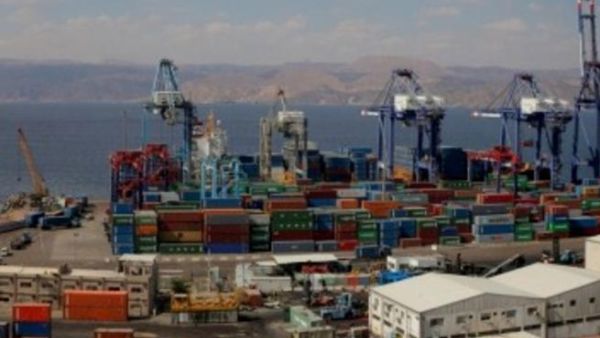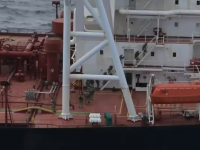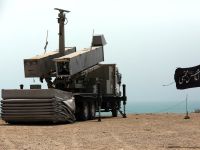Aqaba Container Terminal ends 2010 with an outstanding record

Aqaba Container Terminal, Jordan’s primary gateway to the shipping lines of the Red Sea and beyond, recorded a series of remarkable achievements in 2010, which have allowed the terminal to reach new heights in quality and efficiency standards. The highlight of the year was undoubtedly the field visit conducted by His Majesty King Abdullah II to the terminal in December to inaugurate the port expansion project — which has a total investment value of $235 million — and the deployment of the terminal’s recently acquired ship-to-shore (STS) gantry cranes.
The berth expansion is slated for completion in the year 2013, at which point the facility will have almost doubled its present wharf length. The expansion is expected to increase the terminal’s annual capacity to a projected 1.6 million TEUs. The plan also included the importation of two STS gantry cranes, which were put into operation early in 2010 to substantially bolster the terminal’s throughout capacity. The new cranes have the ability to handle 18 rows of “post panamax” containerships, as well as the ability to complete an average of 30 moves per hour, offering shipping lines cost savings through higher productivity and port capacity.
Moreover, truck turn around time for loading and unloading operations decreased to around 80 minutes, compared to 48 hours in 2004. This is due to the continued revisions made to procedures in the terminal and the management’s unwavering commitment to excellence. Additionally, the storage period for full containers decreased from 3 weeks to 8 days due to expediencies that have been applied to processing and handling.
“We are more than proud of the terminal’s remarkable achievements in 2010, which reflect our steadfast dedication to growth and development,” commented Aqaba Container Terminal’s CEO, Mr. Soren Hansen. “The investments we have made in new robust technologies, together with the essential modifications we have incorporated into our operational procedures and processes, were based on a series of extensive studies which showed us the areas where a change could deliver the greatest long-term benefits. The success of the various strategies we have adopted in 2010 comes as a tremendous validation and we are confident that the terminal’s recent streak of accomplishments will substantially contribute to Jordan’s long-term economic prosperity. The Jordanian maritime shipping industry is embarking on a new chapter, during which the Port of Aqaba is set to reach new heights, in line with the vision of His Majesty King Abdullah II.’’
Mr. Hansen also highlighted ACT’s commitment to empowering the Jordanian workforce, saying: “We always seek to employ Jordanians and to help our local workforce realize its full potential. We continually train, rehabilitate, and reinforce their skills and competencies, as part of our ongoing commitment to sustainable development in the Kingdom.”
Mr. Hansen also underscored ACT’s dedication to improving the services offered to its stakeholders. ACT is currently planning to implement and employ a new web based system, called “TERMVIEW,” which is an applications service geared toward enhancing communication and interaction between the terminal and its various stakeholders , in addition to reducing costs and decreasing time spent on paperwork and electronic and written correspondences. This initiative comes as part of ACT’s continued efforts to join the ranks of other terminals in the APMT network by being the first terminal to test this application in the Middle East.
On the global partnerships front, the terminal signed a partnership agreement with the Second Line of Defense Megaports Initiative, becoming the first official regional gateway in the Levant for containerized cargo destined for the United States. The Megaports Initiative is a key component of a multi-agency, multilayered, defensive network that strengthens the overall capability of its partner countries to detect and deter illicit trafficking of special nuclear and other radioactive materials at key international seaports.
In 2010, ACT witnessed the arrival of "APL Amman" at its harbor in its maiden call to Aqaba. "APL Amman" is considered the only vessel of its kind to carry the name of the Jordanian Capital, Amman, and sail along the APL line network. The ship’s choosing of ACT from amongst the many port options available highlights the terminal’s significance and its ability to serve greater navigation lines competing against other ports in the Middle East and North Africa.
Additionally, as part of its longstanding commitment to the local community, ACT hosted a grand celebration of Global Safety Day, featuring a host of activities geared toward promoting awareness on the importance of health, safety, and environmental preservation. In line with its implied duties towards the populations of Aqaba, and in collaboration with Aqaba Rotary Club, the terminal also rehabilitated the Sports Court of the SOS Children’s Village, establishing several facilities that will greatly enhance the overall experience of the village’s residents. The terminal also adopted two local schools under the Madrasati initiative — Al Shamilah School for Girls and Saffiyah Bint Abdul Mutaleb School — and will financially sponsor essential rehabilitation and development activities within the schools over the next three years.
Internally, the terminal witnessed substantial developments in the arena of worker rights. Most notably, the terminal signed a Code of Conduct agreement with the General Trade Union of Sea Ports and Clearance, with the objective of maintaining a sustainable partnership between the two parties. The new Code of Conduct stresses open communication between the various parties involved in the terminal’s operations, in addition to outlining the legal framework to be adopted during the implementation of procedures and policies.
An agreement was also reached guaranteeing the continuity of the terminal’s operations around the clock, which comes to embody the real partnership shared between the two parties by implementing a series of constructive policies and procedures geared toward bolstering productivity and maintaining harmony in the terminals. The agreement stipulates that ACT provides its employees with a revised biannual rewards program that will work in line with the incentives program currently implemented at the terminal. ACT will additionally revise its annual bonuses policy and will work to develop and support the terminal’s social fund to help employees realize some of their long-term personal pursuits, particularly with regards to securing college educations for their children.
Despite its substantial scope of work, ACT remains one of the leading terminals globally in terms of green operation. In addition to streamlining its operations to ensure energy-efficiency, the terminal spares no efforts towards developing and employing greener yard equipment to conserve fuel and energy consumption. A successful example of this are the Eco- Rubber-Tyred Gantry Cranes (RTGs) currently being used at the terminal, which save up to 40 percent on fuel and emissions through more efficient engine operation and improved conservation of kinetic energy. Additionally, throughout its berth expansion and other activities, the terminal has adhered to a strict policy geared toward the preservation of the coral reefs and sea turtle populations that thrive within its operational vicinity.
Background Information
Aqaba Container Terminal
In 2003, the Aqaba Development Corporation (ADC), on behalf of the Aqaba Special Economic Zone Authority, was on a mission to acquire a strategic partnership to improve the efficiency, capacity and the operational performance of the container terminal in Aqaba. After signing a Terminal Management Contract with ADC in 2004, APM Terminals (part of the global A.P. Møller–Maersk Group), took over the management and operation of the terminal.
A 25-year Joint Development Agreement (JDA) was signed between ADC and the Aqaba Container Terminal (ACT) in 2006. Under the contract, APM Terminals Jordan operates, manages and markets ACT in addition to executing the Master Plan, which anticipates achieving a drastic increase of throughput capacity through a combination of physical and operational improvements.
Aqaba Development Corporation
Aqaba Development Corporation (ADC) was launched in 2004 with the objective of unlocking the potential of the Aqaba Special Economic Zone (ASEZ) by accelerating its economic growth and development.
Launched by ASEZA and the Government of Jordan, ADC owns Aqaba’s seaport, airport and strategic parcels of land as well as the development and management rights for these assets in addition to key infrastructure and utilities.






